- Home
- R. J. Palacio
The Julian Chapter Page 6
The Julian Chapter Read online
Page 6
“There was a boy in my school called … well, they called him Tourteau,” she continued. “He was … how do you say the word … a crippled? Is that how you say it?”
“I don’t think people use that word anymore, Grandmère,” I said. “It’s not exactly politically correct, if you know what I mean.”
She flicked her hand at me. “Americans are always coming up with new words we can’t say anymore!” she said. “Alors, well, Tourteau’s legs were deformed from the polio. He needed two canes to walk with. And his back was all twisted. I think that’s why he was called tourteau, crab: he walked sideways like a crab. I know, it sounds very harsh. Children were meaner in those days.”
I thought about how I called August “the freak” behind his back. But at least I never called him that to his face!
Grandmère continued talking. I have to admit: at first I wasn’t into her telling me one of her long stories, but I was getting into this one.
“Tourteau was a little thing, a skinny thing. None of us ever talked to him because he made us uncomfortable. He was so different! I never even looked at him! I was afraid of him. Afraid to look at him, to talk to him. Afraid he would accidentally touch me. It was easier to pretend he didn’t exist.”
She took a long sip of her wine.
“One morning, a man came running into our school. I knew him. Everyone did. He was a Maquis, a partisan. Do you know what that is? He was against the Germans. He rushed into the school and told the teachers that the Germans were coming to take all the Jewish children away. What? What is this? I could not believe what I was hearing! The teachers in the school went around to all the classes and gathered the Jewish children together. We were told to follow the Maquis into the woods. We were going to go hide. Hurry hurry hurry! I think there were maybe ten of us in all! Hurry hurry hurry! Escape!”
Grandmère looked at me, to make sure I was listening—which, of course, I was.
“It was snowing that morning, and very cold. And all I could think was, If I go into the woods, I will ruin my shoes! I was wearing these beautiful new red shoes that Papa had brought me, you see. As I said before, I was a frivolous girl—perhaps even a little stupid! But this is what I was thinking. I did not even stop to think, Well, where is Maman and Papa? If the Germans were coming for the Jewish children, had they come for the parents already? This did not occur to me. All I could think about were my beautiful shoes. So, instead of following the Maquis into the woods, I snuck away from the group and went to hide inside the bell tower of the school. There was a tiny room up there, full of crates and books, and there I hid. I remember thinking I would go home in the afternoon after the Germans came, and tell Maman and Papa all about it. This is how stupid I was, Julian!”
I nodded. I couldn’t believe I had never heard this story before!
“And then the Germans came,” she said. “There was a narrow window in the tower, and I could see them perfectly. I watched them run into the woods after the children. It did not take them very long to find them. They all came back together: the Germans, the children, the Maquis soldier.”
Grandmère paused and blinked a few times, and then she took a deep breath.
“They shot the Maquis in front of all the children,” she said quietly. “He fell so softly, Julian, in the snow. The children cried. They cried as they were led away in a line. One of the teachers, Mademoiselle Petitjean, went with them—even though she was not Jewish! She said she would not leave her children! No one ever saw her again, poor thing. By now, Julian, I had awakened from my stupidity. I was not thinking of my red shoes anymore. I was thinking of my friends who had been taken away. I was thinking of my parents. I was waiting until it was nighttime so I could go home to them!
“But not all the Germans had left. Some had stayed behind, along with the French police. They were searching the school. And then I realized, they were looking for me! Yes, for me, and for the one or two other Jewish children who had not gone into the woods. I realized then that my friend Rachel had not been among the Jewish children who were marched away. Nor Jakob, a boy from another village who all the girls wanted to marry because he was so handsome. Where were they? They must have been hiding, just like I was!
“Then I heard creaking, Julian. Up the stairs, I heard footsteps up the stairs, coming closer to me. I was so scared! I tried to make myself as small as possible behind the crate, and hid my head beneath a blanket.”
Here, Grandmère covered her head with her arms, as if to show me how she was hiding.
“And then I heard someone whisper my name,” she said. “It was not a man’s voice. It was a child’s voice.
“Sara? the voice whispered again.
“I peeked out from the blanket.
“Tourteau! I answered, astonished. I was so surprised, because in all the years I had known him, I don’t think I had ever said a word to him, nor him to me. And yet, there he was, calling my name.
“They will find you here, he said. Follow me.
“And I did follow him, for by now I was terrified. He led me down a hallway into the chapel of the school, which I had never really been to before. We went to the back of the chapel, where there was a crypt—all this was new to me, Julian! And we crawled through the crypt so the Germans would not see us through the windows, because they were looking for us still. I heard when they had found Rachel. I heard her screaming in the courtyard as they took her away. Poor Rachel!
“Tourteau took me down to the basement beneath the crypt. There must have been one hundred steps at least. These were not easy for Tourteau, as you can imagine, with his terrible limp and his two canes, but he hopped down the steps two at a time, looking behind him to make sure I was following.
“Finally, we arrived at a passage. It was so narrow we had to walk sideways to get through. And then we were in the sewers, Julian! Can you imagine? I knew instantly because of the smell, of course. We were knee-deep in refuse. You can imagine the smell. So much for my red shoes!
“We walked all night. I was so cold, Julian! Tourteau was such a kind boy, though. He gave me his coat to wear. It was, to this day, the most noble act anyone has ever done for me. He was freezing, too—but he gave me his coat. I was so ashamed for the way I had treated him. Oh, Julian, I was so ashamed!”
She covered her mouth with her fingers, and swallowed. Then she finished the glass of wine and poured herself another.
“The sewers lead to Dannevilliers, a small village about fifteen kilometers away from Aubervilliers. Maman and Papa had always avoided this town because of the smell: the sewers from Paris drained onto the farmland there. We wouldn’t even eat apples grown in Dannevilliers! But it’s where Tourteau lived. He took me to his house, and we cleaned ourselves by the well, and then Tourteau brought me to the barn behind his house. He wrapped me up in a horse blanket and told me to wait. He was going to get his parents.
“No, I pleaded. Please don’t tell them. I was so frightened. I wondered if, when they saw me, they would call the Germans. You know, I had never met them before!
“But Tourteau left, and a few minutes later, he returned with his parents. They looked at me. I must have seemed quite pathetic there—all wet and shivering. The mother, Vivienne, put her arms around me to comfort me. Oh, Julian, that hug was the warmest hug I have ever felt! I cried so hard in this woman’s arms, because I knew then, I knew I would never cry in my own maman’s arms again. I just knew it in my heart, Julian. And I was right. They had taken Maman that same day, along with all the other Jews in the city. My father, who had been at work, had been warned that the Germans were coming and managed to escape. He was smuggled to Switzerland. But it was too late for Maman. She was deported that day. To Auschwitz. I never saw her again. My beautiful maman!”
She took a deep breath here, and shook her head.
Grandmère was silent for a few seconds. She was looking into the air like she could see it all happening again right in front of her. Now I understood why she’d never talked about
this before: it was too hard for her.
“Tourteau’s family hid me for two years in that barn,” she continued slowly. “Even though it was so dangerous for them. We were literally surrounded by Germans, and the French police had a large headquarters in Dannevilliers. But every day, I thanked my maker for the barn that was my home, and the food that Tourteau managed to bring me—even when there was hardly any food to go around. People were starving in those days, Julian. And yet they fed me. It was a kindness that I will never forget. It is always brave to be kind, but in those days, such kindnesses could cost you your life.”
Grandmère started to get teary-eyed at this point. She took my hand.
“The last time I saw Tourteau was two months before the liberation. He had brought me some soup. It wasn’t even soup. It was water with a little bit of bread and onions in it. We had both lost so much weight. I was in rags. So much for my pretty clothes! Even so, we managed to laugh, Tourteau and I. We laughed about things that happened in our school. Even though I could not go there anymore, of course, Tourteau still went every day. At night, he would tell me everything he had learned so that I would stay smart. He would tell me about all my old friends, too, and how they were doing. They all still ignored him, of course. And he never revealed to any of them that I was still alive. No one could know. No one could be trusted! But Tourteau was an excellent narrator, and he made me laugh a lot. He could do wonderful imitations, and he even had funny nicknames for all my friends. Imagine that, Tourteau was making fun of them!
“I had no idea you were so mischievous! I told him. All those years, you were probably laughing at me behind my back, too!
“Laughing at you? he said. Never! I had a crush on you; I never laughed at you. Besides, I only laughed at the kids who made fun of me. You never made fun of me. You simply ignored me.
“I called you Tourteau.
“And so? Everyone called me that. I really don’t mind. I like crabs!
“Oh, Tourteau, I am so ashamed! I answered, and I remember I covered my face with both my hands.”
At this point, Grandmère covered her face with her hands. Although her fingers were bent with arthritis now, and I could see her veins, I pictured her young hands covering her young face so many years ago.
“Tourteau took my hands with his own hands,” she continued, slowly removing her hands from her face. “And he held my hands for a few seconds. I was fourteen years old then, and I had never kissed a boy, but he kissed me that day, Julian.”
Grandmère closed her eyes. She took a deep breath.
“After he kissed me, I said to him, I don’t want to call you Tourteau anymore. What is your name?”
Grandmère opened her eyes and looked at me.
“Can you guess what he said?” she asked.
I raised my eyebrows as if to say “no, how would I know?”
Then she closed her eyes again and smiled.
“He said, My name is Julian.”
“Oh my God!” I cried. “That’s why you named Dad Julian?” Even though everyone called him Jules, that was his name.
“Oui,” she said, nodding.
“And I’m named after Dad!” I said. “So I’m named after this kid! That is so cool!”
She smiled and ran her fingers through my hair. But she didn’t say anything.
Then I remembered her saying, “The last time I saw Tourteau …”
“So what happened to him?” I asked. “To Julian?”
Almost instantaneously, tears rolled down Grandmère’s cheeks.
“The Germans took him,” she said, “that same day. He was on his way to school. They were making another sweep of the village that morning. By now, Germany was losing the war and they knew it.”
“But …,” I said, “he wasn’t even Jewish!”
“They took him because he was crippled,” she said between sobs. “I’m sorry, I know you told me that word is a bad word, but I don’t know another word in English. He was an invalide. That is the word in French. And that is why they took him. He was not perfect.” She practically spat out the word. “They took all the imperfects from the village that day. It was a purge. The Gypsies. The shoemaker’s son, who was … simple. And Julian. My tourteau. They put him in a cart with the others. And then he was put on a train to Drancy. And from there to Auschwitz, like my mother. We heard later from someone who saw him there that they sent him to the gas chambers right away. Just like that, poof, he was gone. My savior. My little Julian.”
She stopped to wipe her eyes with a handkerchief, and then drank the rest of the wine.
“His parents were devastated, of course, M. Beaumier and Mme. Beaumier,” she continued. “We didn’t find out he was dead until after the liberation. But we knew. We knew.” She dabbed her eyes. “I lived with them for another year after the war. They treated me like a daughter. They were the ones who helped track down Papa, although it took some time to find him. So much chaos in those days. When Papa finally was able to return to Paris, I went to live with him. But I always visited the Beaumiers—even when they were very old. I never forgot the kindness they showed me.”
She sighed. She had finished her story.
“Grandmère,” I said, after a few minutes. “That’s like, the saddest thing I’ve ever heard! I didn’t even know you were in the war. I mean, Dad’s never talked about any of this.”
She shrugged. “I think it’s very possible that I never told your father this story,” she said. “I don’t like to talk about sad things, you know. In some ways, I am still the frivolous girl I used to be. But when I heard you talking about that little boy in your school, I could not help but think of Tourteau, of how afraid I had once been of him, of how badly we had treated him because of his deformity. Those children had been so mean to him, Julian. It breaks my heart to think of it.”
When she said that, I don’t know, something just really broke inside of me. Completely unexpected. I looked down and, all of a sudden, I started to cry. And when I say I started to cry, I don’t mean a few tears rolling down my cheeks—I mean like, full-scale, snot-filled crying.
“Julian,” she said softly.
I shook my head and covered my face with my hands.
“I was terrible, Grandmère,” I whispered. “I was so mean to Auggie. I’m so sorry, Grandmère!”
“Julian,” she said again. “Look at me.”
“No!”
“Look at me, mon cher.” She took my face in her hands and forced me to look at her. I felt so embarrassed. I really couldn’t look her in the eyes. Suddenly, that word that Mr. Tushman had used, that word that everyone kept trying to force on me, came to me like a shout. REMORSE!
Yeah, there it was. That word in all its glory.
REMORSE. I was shaking with remorse. I was crying with remorse.
“Julian,” said Grandmère. “We all make mistakes, mon cher.”
“No, you don’t understand!” I answered. “It wasn’t just one mistake. I was those kids who were mean to Tourteau.… I was the bully, Grandmère. It was me!”
She nodded.
“I called him a freak. I laughed behind his back. I left mean notes!” I screamed. “Mom kept making excuses for why I did that stuff … but there wasn’t any excuse. I just did it! And I don’t even know why. I don’t even know.”
I was crying so hard I couldn’t even speak.
Grandmère stroked my head and hugged me.
“Julian,” she said softly. “You are so young. The things you did, you know they were not right. But that does not mean you are not capable of doing right. It only means that you chose to do wrong. This is what I mean when I say you made a mistake. It was the same with me. I made a mistake with Tourteau.
“But the good thing about life, Julian,” she continued, “is that we can fix our mistakes sometimes. We learn from them. We get better. I never made a mistake like the one I made with Tourteau again, not with anyone in my life. And I have had a very, very long life. You will learn from your mis
take, too. You must promise yourself that you will never behave like that with anyone else again. One mistake does not define you, Julian. Do you understand me? You must simply act better next time.”
I nodded, but I still cried for a long, long time after that.
That night, I dreamt about Auggie. I don’t remember the details of the dream, but I think we were being chased by Nazis. Auggie was captured, but I had a key to let him out. And in my dream, I think I saved him. Or maybe that’s what I told myself when I woke up. Sometimes, it’s hard to know with dreams. I mean, in this dream the Nazis all looked like Darth Vader’s Imperial officers anyway, so it’s hard to put too much meaning into dreams.
But what was really interesting to me, when I thought about it, is that it had been a dream—not a nightmare. And in the dream, Auggie and I were on the same side.
I woke up super early because of the dream, and didn’t go back to sleep. I kept thinking about Auggie, and Tourteau—Julian—the heroic boy I was named for. It’s weird: This whole time I had been thinking about Auggie like he was my enemy, but when Grandmère told me that story, I don’t know, it all kind of just sank in with me. I kept thinking of how ashamed the original Julian would be to know that someone who carried his name had been so mean.
I kept thinking about how sad Grandmère was when she told the story. How she could remember all the details, even though it happened like, seventy years ago. Seventy years! Would Auggie remember me in seventy years? Would he still remember the mean things I called him?
I don’t want to be remembered for stuff like that. I would want to be remembered the way Grandmère remembers Tourteau!
Mr. Tushman, I get it now! R. E. M. O. R. S. E.
I got up as soon as it was light out, and wrote this note.

 Wonder
Wonder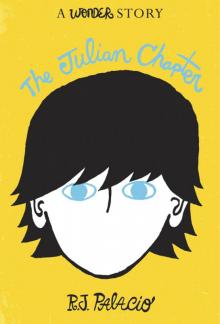 The Julian Chapter
The Julian Chapter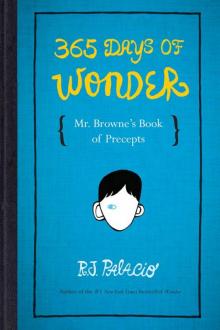 365 Days of Wonder
365 Days of Wonder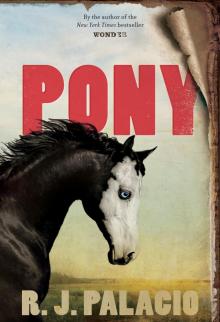 Pony
Pony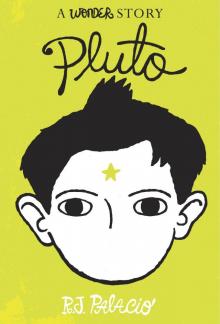 Pluto
Pluto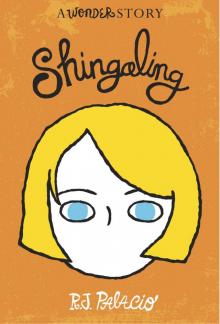 Shingaling
Shingaling